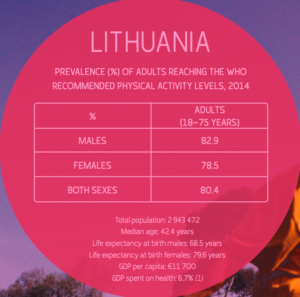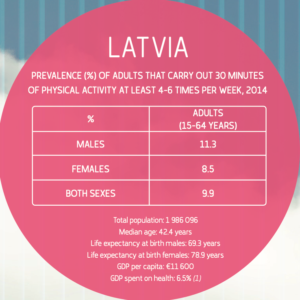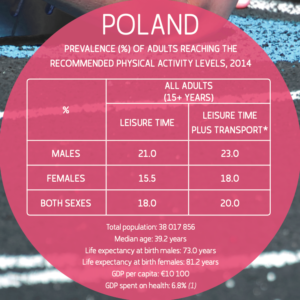Project “Social Inclusion through Traditional Baltic Sports and games” addresses Erasmus+ Sport Programe topic “Encourage social inclusion and equal opportunities in sport” and European policies in the field of sport. Most people in Europe do not reach the minimum levels of physical activity recommended by the World Health Organization (WHO). The majority of European citizens do not engage in sufficient physical activity, with 60 % never or seldom playing sport or exercising. In particular, people from low socioeconomic backgrounds, minority ethnic groups, and people with disabilities are not active enough.
According to the Fact sheet on Lithuania (2014), 80.4% of adults (aged 18—75 years) reach the physical activity levels recommended by WHO’s Global Recommendations on Physical Activity for Health (2010). National data are available for adults and older adults, showing that fewer older adults (aged 50—75 years) are active (76.5%) than adults aged 18—49 years (83.2%). The WHO Global Health Observatory (GHO) 2010 estimates for Lithuanian adults (aged 18+ years) are similar to the national survey results: 79.8% meet the WHO recommended physical activity levels, with more males (83.4%) active than females (76.9%).

According to the Fact sheet on Latvia (2014), 9.9% of adults (aged 15—64 years) are physically active for at least 30 minutes 4—6 times per week (equal to 120 minutes or more). Against this measure, males on average are more active (11.3%) than females (8.5%). The WHO Global Health Observatory (GHO) data from 2010 for the Latvian adult population (aged 18+ years) show that 76.2% are meeting the WHO recommended physical activity levels and the likelihood of meeting the physical activity recommendations is higher among males, with 80.7% for males and 72.7% for females.

According to the Fact sheet on Poland (2014), 18.5% of adults (aged 15–69 years) meet the WHO Global recommendations on physical activity for health (2010) in terms of their leisure-time activities. The WHO Global Health Observatory (GHO) 2010 estimates for Poland (6) show that 79.5% of the adult population (aged 18+ years) meet the WHO recommended physical activity levels (across all domains of life, including work/household, transport and leisure time), with more males (85.6%) being active than females (74.0%).

This project aims to form a network supporting Traditional Baltic Sports and Games (LT, LV, PL), and to develop supportive tools. Each partner involved has relevant experience and qualifications required to promote traditional sport and awareness raising of sport activity importance for heritage, health and social inclusion.
